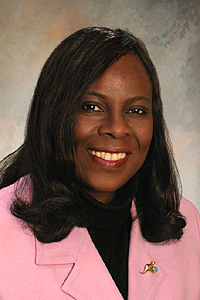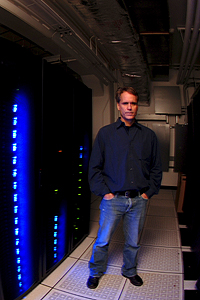Chicago in the News
The Chronicle’s biweekly column Chicago In the News offers a digest of commentary and quotations by a few of the University faculty members, students and alumni who have been headlining the news in recent weeks. Chicago faculty members are some of the most frequently quoted experts, so space allows publishing references to only selected examples.
To read many of the full newspaper articles mentioned in this column, visit the In the News column at the University News Office Web site: http://www-news.uchicago.edu/.
Getting aggressive with health disparities
 Olufunmilayo Olopade | |
The work of Olufunmilayo Olopade, the Walter L. Palmer Distinguished Service Professor in Medicine and Human Genetics, was featured in the Friday, Feb. 2 issue of Science magazine. Olopade is trying to understand the disparities of breast cancer by studying the aggressive breast cancer tumors that a disproportionate number of women of African descent are diagnosed with, and often at a young age. The article noted that Olopade, a MacArthur Foundation “genius grant” recipient, is using her MacArthur funds to trace the biology of disparity to where its roots may lie, in Africa. She is trying to elevate disparities research, she says, to a science, noting that it is her patients who remind her of how broad such research should be. Referring to an aggressive breast cancer case of a 50-year-old African-American woman, who initially declined treatment, Olopade said: “If I don’t have the experience of seeing patients like that, who walk in, and I studied disparities, I would never get it.”
Digital reality
Nicole Pinkard, Research Associate and Director of Technology for the Center for Urban School Improvement, who is using a MacArthur Foundation grant to study digital learning in Chicago Public Schools, was quoted in a Sunday, Feb. 11 Chicago Tribune article. The story reported on the digital learning activities at North Kenwood/Oakland Charter School, where Pinkard created Digital Youth, an after-school program that introduces students to professionals who share their skills in music, art and video game development. The results of the digital-rich curriculum at the charter school, which is operated by the University, supports a growing body of research that suggests game-based technology can provide a way to teach students in the classroom, the article noted. “It’s our reality,” said Pinkard. “They are playing it at home. So we have to think of new ways to extend traditional notions of learning.”
Marketing makes or breaks
An article about Humanized, a software company founded by four undergraduate alumni—Asa Raskin, Jono DiCarlo, Atul Varma and Andrew Wilson—quoted Scott Meadow, Clinical Professor of Entrepreneurship in the Graduate School of Business. Their company’s new software product Enso improves productivity in many computer tasks by seconds. Published Monday, Feb. 12 in the Chicago Tribune, the article noted that more than cutting-edge technology is needed for technology companies to succeed. “Most great technology companies succeed because of marketing, not because their technology is great. The specialized knowledge in being able to market the technology is what separates the winners from the losers, normally,” said Meadow.
 Robert Gardner | |
Connecting scientists
Robert Gardner, Senior Research Associate in the Enrico Fermi Institute and the Computation Institute, was interviewed and photographed for a Wednesday, Feb. 14 Chicago Sun-Times story about his work with the regional computer center known as Tier2 and the ATLAS Collaboration, which will study how particles acquire their mass and how they interact. The center will receive data from CERN’s Large Hadron Collider Detector, a particle detector in Geneva, Switzerland. Tier2, located at the University, connects to a national computing infrastructure called the Open Science Grid, a national network dedicated to research. “Just like we have a transportation network with Chicago as its hub, we have computer networks that connect to major institutions throughout the world,” said Gardner.
‘No-brainer’ service
A Chicago Tribune article, which reported on Bank of America’s new policy to offer credit cards to undocumented workers in the United States, quoted Raghuram Rajan, the Eric J. Gleacher Distinguished Service Professor of Finance in the Graduate School of Business. The bank’s move to provide this service to undocumented immigrant workers has its critics, but Rajan calls the decision a “no-brainer,” noting that it expands the financial services market and provides needed services to immigrants, making their lives more manageable. “Access to credit is really very important for the poor and underprivileged, and clearly illegal immigrants are part of that group. Not only are you drawing them into the fold, but you’re making their lives better and the lives of others better because their money goes through the system.” He also noted that “We don’t know how much additional immigration this would encourage.” The article appeared Thursday, Feb. 15.
Airing dirty laundry
Michael Dawson, the John D. MacArthur Distinguished Service Professor in Political Science and the College, commented on anEsquire magazine article which, according to an Associated Press story, brought a debate and discussions among African-Americans about the black underclass into the mainstream media. The AP story noted that the Esquire article, written by black author John Ridley, who used a racial epithet to introduce his commentary, provoked many in the black community. Dawson commented on how African Americans typically share their critical views of black America only with other African Americans. “There’s always been a norm in the black community that self criticisms are conducted within the black community. Malcolm X said you don’t wash your dirty laundry in public. A group that feels it’s under attack and oppressed wants to present a united front.” The AP story was released on the news wire service Thursday, Feb. 15.
Fraud under a microscope
Research on corporate fraud conducted by Luigi Zingales, the Robert C. McCormack Professor of Entrepreneurship and Finance in the Graduate School of Business, was featured in the Sunday, Feb. 18 business section of the New York Times. Zingales analyzed 230 cases of alleged corporate fraud at large companies and found that 32 percent were uncovered through internal governance, while employee whistle-blowers accounted for 13 percent, the article said. The media discovered 11 percent of fraud cases, according to the research.
![[Chronicle]](/images/sidebar_header_oct06.gif)